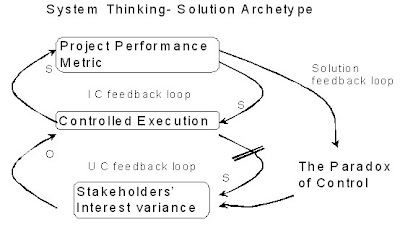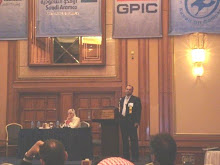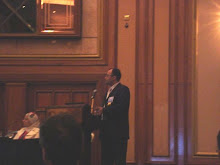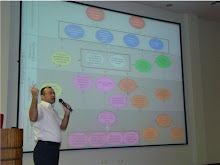Project’s control is a challenge. In our Project, we developed a rigid control process with metrics scattered over all project processes. Corrective actions were implemented whenever an indicator slipped outside accepted boundary. However, there was a decrease in sponsor’s satisfaction along the way. We performed a system thinking analysis to identify root causes and find best solutions as shown below Post Project Review: We learned that Project Manager must be vigilant in controlling the project outcomes in a prevailing climate of change and uncertainty.
Post Project Review: We learned that Project Manager must be vigilant in controlling the project outcomes in a prevailing climate of change and uncertainty.
While those affect both the Project Manager and other stakeholders, it was erroneous to expect the project to maintain delivering within agreed boundaries (STCQ) where predictable deviations from the plan are viewed by senior stakeholders as “out of control”.
The “zone” of middle management is bounded from the lower and upper sides by project managers and senior stakeholders respectively (shown in figure below). Project managers sense strategic directions/change by interacting with this zone. The prevailing assumption that this zone will always react to strategic management stimuli in the same way was here questioned! The reason to which is that the only certainty in the “zone” is unpredictability; Strategic and senior managers were made aware of this fact for future projects.
Project managers sense strategic directions/change by interacting with this zone. The prevailing assumption that this zone will always react to strategic management stimuli in the same way was here questioned! The reason to which is that the only certainty in the “zone” is unpredictability; Strategic and senior managers were made aware of this fact for future projects.
Controls comprise the craft of maintaining time, cost and quality by means of project control processes (process flow diagrams, responsibility activity matrix, QM, assessment criteria, KPIs and the like) along with the art of managing relationships with stakeholders and the forces they exerted in the “zone” (Theilen, 1999).
As a result, our Project managers gained a broader understanding of the three dimensions of control (figure below) and they comprehended that the “Control Process” is closely related to other Management Processes, like Stakeholder Management. 
About The Author

- Eng. Samer el Barakeh, MPM, PMP
- Samer el Barakeh was born in Lebanon, 1973. He completed his Bachelor in Engineering-CCE at Beirut Arab University-Lebanon in 1996 with honours. Samer was granted Masters Degree in Project Management (MPM) from the University of Sydney-Australia with honours. He also gained the Project Management Professional (PMP) Credential from The Project Management Institute (PMI). Samer is a member of the Order of Architects and Engineers in Lebanon since 1996, The Project Management Institute (PMI), Arabian Gulf Chapter (AGC-PMI) and Lebanon Chapter-PMI. During his 13 years of professional experience in Lebanon, Australia and Saudi Arabia, Samer held many positions among them: Telecommunication Site Engineer, Site Manager, Low Current Service Head, and he is currently Senior Systems Analyst at the General Project Construction Division. Samer is a Project Management Consultant and Training Provider for universal organizations like Business Management Consultants (USA) www.bmc-online.com and PMCTQuest (Canada) www.pmctquest.com Samer is a Registered Training Provider for Project Management Professional (PMP), and he provides training in Program Management, Portfolio Management,PMO...
Select a topic to view content
- A comparison between PMBOK and Prince2 Methodologies and reflection on case study examples (1)
- ABC to Avoid Project Failure (1)
- Business Case and Quantitative Benefits (1)
- Do we need more 'Planners' ? (1)
- Fasilitator in Partnering-A Coincise Shot (1)
- How to Ensure Stratgic Alignment of Our Projects? (1)
- Individual Dissimilarity and Team Work (1)
- Knowledge Management (1)
- Maturity Models-The Pros and Cons (1)
- Organizational Advantages from Partnering (1)
- Organizational Maturity: Lets Head Upwards... (1)
- Organizational Strategy and Project Alignement (1)
- Practical Solutions 1 of 6: Introduce RMMM (1)
- Practical Solutions 2 of 6: Facilitate Change to Perk up Maturity (1)
- Practical Solutions 3 of 6: Leverage Organisational Culture Barrier (1)
- Practical Solutions 4 of 6: Organisational Cultural Alignment (1)
- Practical Solutions 5 of 6: Defining a Unified Decision Making Tool (1)
- Practical Solutions 6 of 6: Understanding The Paradox of Control (1)
- Programme Management to Implement Strategy (1)
- Project Management and Construction Management (1)
- Project Managers relocated before Proper Project Closure and Learning Lessons (1)
- Project Managers' Power (1)
- Strategic Planning (1)
- Successful Project Management Office-PMO (1)
- System Thinking: Archetypes at Work... (1)
- The Partnering Change Process (1)
- The Upper Hand… Leadership skills or Processes? (1)
- Thinking about change needed? Maybe you should be more ‘worried’ about how to make it real (1)
- Vision Mission and Objectives What and Why? (1)
- What is meant by Portfolio and Programme Management (1)
- Why Partnering in Organizations? (1)
July 1, 2007
Practical Solutions 6 of 6: Understanding The Paradox of Control
Posted by
Eng. Samer el Barakeh, MPM, PMP
at
6:58 PM
0
comments
![]()
![]()
Labels: Practical Solutions 6 of 6: Understanding The Paradox of Control
Subscribe to:
Comments (Atom)
Followers
All Titles
A comparison between PMBOK and Prince2 Methodologies and reflection on case study examples
ABC to Avoid Project Failure
Business Case and Quantitative Benefits
Do we need more 'Planners' ?
Fasilitator in Partnering-A Coincise Shot
How to Ensure Stratgic Alignment of Our Projects?
Individual Dissimilarity and Team Work
Knowledge Management
Maturity Models-The Pros and Cons
Organizational Advantages from Partnering
Organizational Maturity: Lets Head Upwards...
Organizational Strategy and Project Alignement
Practical Solutions 1 of 6: Introduce RMMM
Practical Solutions 2 of 6: Facilitate Change to Perk up Maturity
Practical Solutions 3 of 6: Leverage Organisational Culture Barrier
Practical Solutions 4 of 6: Organisational Cultural Alignment
Practical Solutions 5 of 6: Defining a Unified Decision Making Tool
Practical Solutions 6 of 6: Understanding The Paradox of Control
Programme Management to Implement Strategy
Project Management and Construction Management
Project Managers relocated before Proper Project Closure and Learning Lessons
Project Managers' Power
Strategic Planning
Successful Project Management Office-PMO
System Thinking: Archetypes at Work...
The Partnering Change Process
The Upper Hand… Leadership skills or Processes?
Thinking about change needed? Maybe you should be more ‘worried’ about how to make it real
Vision Mission and Objectives What and Why?
What is meant by Portfolio and Programme Management
Why Partnering in Organizations?















